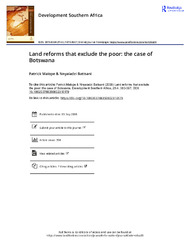Land reforms that exclude the poor: the case of Botswana.
Abstract
Land reforms in Botswana, unlike those in other southern African countries, were not undertaken with the primary objective of redistributing land, but rather with the three objectives of increasing agricultural productivity, conserving range resources and improving social equity in rural Botswana. While there was modest success with the first two goals, the same cannot be said for the third. As it turned out, the two agricultural land reform policies (the Tribal Land Grazing Policy and the National Policy on Agricultural Development) harmed many poor households living in communal areas. Poor people were excluded by constraints such as high development costs, ownership of only small herds or no cattle at all, and lack of human capital. Complementary programmes in the form of innovative loan products and cash grants are needed to compensate them and so help them participate in the land reform process.
Collections
- Research articles [88]

